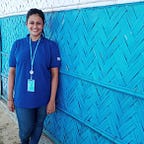Bangladesh: Livelihoods project uses art to put women’s issues centre stage
A World Food Programme-backed theatre event in Cox’s Bazar trains budding entrepreneurs on nutrition, health and life skills
“18 or more — not before. Now repeat after me” — a performer chants with the crowd following her cue. The zeal of the artist touches the attentive of audience of 60 local women gathered on a Sunday afternoon in October. If sounds had colours, this would be bright red turning very quickly to a pale white.
Child marriage
Under a blue sky, the women vow not to allow girls aged under 18 to marry. Here, in Cox’s Bazar, child marriage is common, as it is elsewhere in Bangladesh — 66 percent of girls are married before that age. The women in this group are taking part in an outdoor theatre session organized by the World Food Programme (WFP) with the aim of raising awareness around the issue.
WFP’s livelihoods programme supports some of the most vulnerable groups from communities in Cox’s Bazar through training in social networking, financial inclusion, disability inclusion, as well as social and behaviour-change communication. Around 20,000 families have benefited from the programme since 2012.
Cash grants
The participants in WFP’s project in Cox’s Bazar are taking part in a two-year entrepreneurial-training programme at the end of which they are provided with cash grants to start small businesses. The programme provides more than that, though. Women and families are also given information and training in literacy, numeracy, nutrition, hygiene, and general life skills — with events such as today’s.
Throughout their performance, the artists keep the audience on their toes. They perform several songs to promote the importance of vaccination, hygiene, maternal and child health. The last section of the show focuses on another uneasy subject — domestic violence, and what women and girls can do to protect themselves and where to go to report such incidents. All of this is done in the Chatgaya dialect of Cox’s Bazar and Chittagong regions of Bangladesh.
“The folk songs talk about the villages, the people residing in those villages, and their hopes and dreams in their language. It is from the people of the soil, for the people of the soil. That is why we weave our stories through these songs,” says Liza Parvin, lead singer of the group.
“We have to know what our audience wants, what creates an interest among them, and what would they like to see. Once we can establish that connection, we can convey our messages very well. Regional dialect helps us to form that connection.”
A key message of the event was that support from organizations such as WFP is vital.
Partner organizations Sushilan elaborated on the importance of such support. Focused on serving the underprivileged people of Bangladesh, the NGO works in emergency support, food security, livelihoods, youth mobilization, WASH, nutrition, and environment. With its creative behaviour-change sessions, it tries to engage and interact with the communities in which they operate.
“In order to reach a greater number of audiences, we need to work with the UN and other international agencies. If we want to see even a minimal change, these programmes should be disseminated widely,” Sushilan’s Md Nurul Islam explains.
With the sun still shining in all its glory, performers finish the final act and the women start to leave. The children inquire if it’s over or not. Seeing that it is, they start running after their mothers somewhat reluctantly. Performers pack up their gear to head to their next destination. Although tired and exhausted, they are on a mission to provide information and knowledge to the community so the show must go on.
